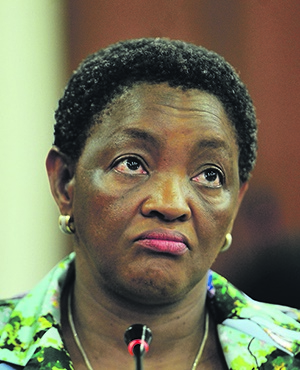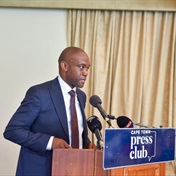
Mamphela Ramphele
The manufacturing of emergencies to justify the flouting of procurement regulations is a widespread practice within the public sector – just look at the South Africa Social Security Agency. The culture of impunity has embedded itself so deeply in our public service that raising questions of accountability is now regarded as abuse of those responsible.
Deflection of public conversations away from the demand of accountability to focusing on the manufactured crisis is being used to great effect by the ANC government. Social Development Minister Bathabile Dlamini has predictably brought us to the point of focusing on the catastrophe that would result from not paying out social grants to the 17 million citizens whose meagre source of income is under threat. Citizens are made to face a choice between demanding compliance with the law and leaving poor people without the means to survive.
Questions about why Dlamini has failed to establish an alternative system of grant payment, as ordered by the Constitutional Court in 2013, are deflected by the mantra that grants will be paid come April 1. Why is Dlamini so keen to sustain the unlawful contract with Cash Paymaster Services (CPS), and ignore all advice from within and outside her department, including Treasury?
We are told that there is no alternative to CPS. The South African Post Office’s offer to step in to the role of paymaster has been dismissed for fear of upsetting CPS. Officials have been dismissed or have resigned from the department for daring to interfere with the minister’s determination to continue the relationship with CPS.
What makes CPS so attractive that taxpayers have to pay more than R10bn for its services? Why continue with this unlawful contract despite the reputed abuse of privileged personal data for commercial purposes, which leads to the further exploitation of the most vulnerable in our society? Who is benefiting from this contract?
President Jacob Zuma’s failure to hold Dlamini accountable for this monumental incompetence is compounded by his calling on the media and citizens not to ask questions, but to wait and see what happens on April 1. What does he know that we don’t? What is in it for him and his party as they insist on continuing with a service provider that does not meet the criteria of good governance?
We need to lean heavily on the words of Chief Justice Mogoeng Mogoeng in the judgment on the Nkandla matter as we assert our right as citizens to hold the president and the minister to account on this issue: “Constitutionalism, accountability and the rule of law constitute the sharp and mighty sword that stands ready to chop the ugly head of impunity off its stiffened neck.”
The social grant saga is not the only manufactured crisis in the country. Come with me to a place of plenty – Bojanala in North West. Citizens of this district have yet to enjoy a safe, regular water supply. In the Bojanala Platinum District Municipality, there has been a water crisis for 10 years.
“We have plenty of water in the Crocodile River,” says district council member Paul Hendriks, “but we need bigger pumps; we need bigger pipes; the purification station should have been upgraded. We have been promised these things, and money is budgeted, but nothing happens. The money disappears.”
Councillors have deliberately been sabotaging water supply in this area for 10 years. They, together with their friends, buy water trucks and get paid handsomely to deliver water to the dry towns. There are 10 trucks, for which the council pays about R1.3m per month. This works out to about R4 000 per truck per day. There is no way of measuring how much water is being delivered, or even if it is being delivered at all. Here is a decade-long, self-made crisis that is good business for corrupt councillors.
Remember the voters’ roll crisis before the municipal elections last year? The Independent Electoral Commission (IEC) failed to implement a 2003 Electoral Court ruling to update the national voters’ roll to ensure that residential addresses were authenticated. In a court challenge, independent candidates in Tlokwe, North West, charged that voters were bussed into wards that the ANC feared it could lose, so they had no way of verifying eligible voters.
The Constitutional Court in that case saw through the trap and said: “Substantively, what we have to grapple with is unique. The IEC – by its own doing – faces a quintessential catch-22. At the time of argument, the certification of the voters’ roll for purposes of the August 2016 municipal elections was imminent. For purposes of certification, the IEC had to either use a voters’ roll that would be defective for containing names of voters without corresponding addresses, or remove those names from the roll without following the due process of law; an inimical limitation of the affected voters’ right to vote ... That explains the approach to us to rescue it from this seemingly intractable problem.”
Now, Dlamini is asking taxpayers to condone her incompetence by using poor people’s vulnerability as a shield. Citizens should ask why her department failed to work with others in government and the private sector to uproot poverty and promote social development to restore the dignity of millions who have been reduced to supplicants.
The indignity of old, disabled and poor mothers of young children having to travel long distances and queue for hours for their miserable R350 per month child grant or R1 300 old age or disability grant should make us all hang our heads in shame. Ours is not a poor country, but we seem to have accepted that poverty and inequality are inevitable features of our constitutional democracy.
We need to recommit to the ideals spelt out in the preamble of our Constitution: “To heal the divisions of the past and establish a society based on democratic values, social justice and fundamental human rights.”
Challenging the culture of impunity that Zuma has embedded in the public service by his own example and by his failure to hold his erring ministers accountable is essential. We have a sharp and mighty sword in our Constitution to do so without fear or favour.
Ramphele is co-founder of ReimagineSA
TALK TO US
Do you agree that the grant debacle was manufactured?
SMS us on 35697 using the keyword GRANTS and tell us what you think. Please include your name and province. SMSes cost R1.50




 Publications
Publications
 Partners
Partners























